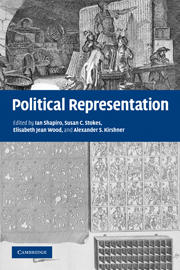Book contents
- Frontmatter
- Contents
- List of figures
- List of tables
- List of contributors
- Preface
- Editors' introduction
- Part I Representation before representative democracy
- Part II Theories of political representation
- Part III Representation and inherited injustice
- Part IV What role for representative quotas?
- Part V Preferences, persuasion, and democratic representation
- 10 Electoral representation and the aristocratic thesis
- 11 Why does the Republican Party win half the votes?
- 12 The impact of electoral debate on public opinions: an experimental investigation of the 2005 New York City mayoral election
- 13 Swing voters, core voters, and distributive politics
- Index
- References
10 - Electoral representation and the aristocratic thesis
Published online by Cambridge University Press: 05 June 2012
- Frontmatter
- Contents
- List of figures
- List of tables
- List of contributors
- Preface
- Editors' introduction
- Part I Representation before representative democracy
- Part II Theories of political representation
- Part III Representation and inherited injustice
- Part IV What role for representative quotas?
- Part V Preferences, persuasion, and democratic representation
- 10 Electoral representation and the aristocratic thesis
- 11 Why does the Republican Party win half the votes?
- 12 The impact of electoral debate on public opinions: an experimental investigation of the 2005 New York City mayoral election
- 13 Swing voters, core voters, and distributive politics
- Index
- References
Summary
Introduction
A modern democracy is conducted by a small body of elected officials who make the laws and control the state. This fact has been taken by some to mean that modern democracy is really a kind of elite rule. In its strong form, this claim implies that modern democratic governments pursue the interests of an elite or aristocracy; the weak form claims no more than the evident fact that government is run by a relatively narrow class of people and leaves open the question of whose interests may be served by this arrangement. Strong form elite theorists do not necessarily reject the possibility that the people may have some influence in picking and choosing which parts of the elite class control government. But they typically stress how weak and ineffective such controls are, especially when it comes to getting the elite to pursue public interests. If public interests are served, on the strong account, they are served gratuitously, by leaders who happen to be publically motivated, and not because of any strong incentive leaders may have to govern for the people.
Versions of the elitist view were stated by Schumpeter years ago and have been developed in various ways by Przeworski, Manin, and Dunn. The emphases of these theories vary quite a bit but all concur in seeing elections as devices for picking an elite and not an instrument by which the people exercise real control over these leaders.
- Type
- Chapter
- Information
- Political Representation , pp. 271 - 303Publisher: Cambridge University PressPrint publication year: 2010
References
- 3
- Cited by

